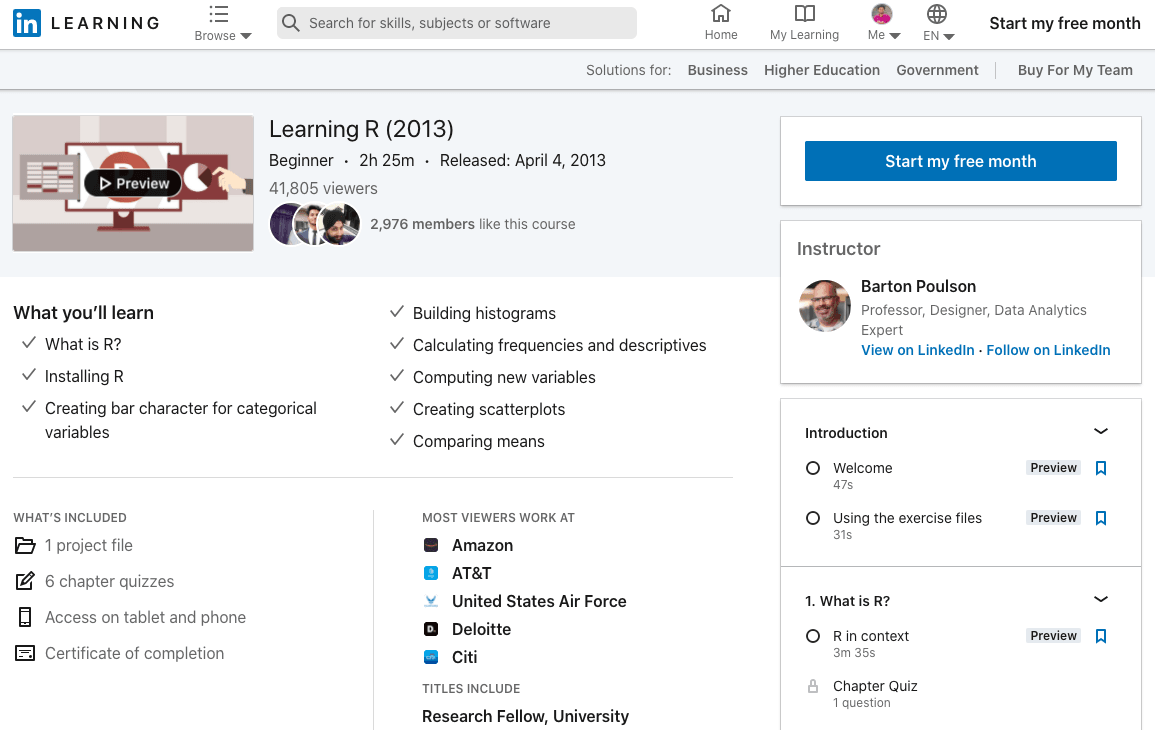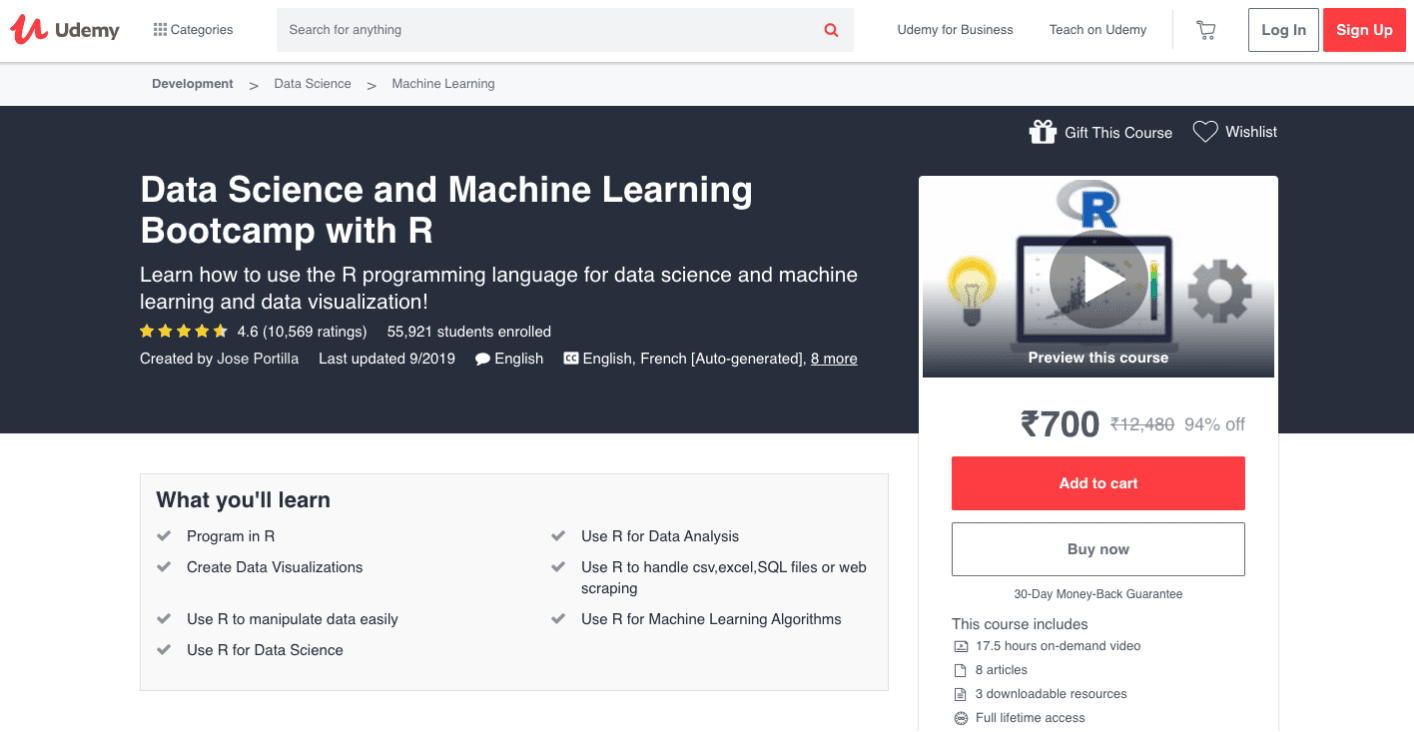Data Science and Machine Learning jobs are much in demand in this era of Artificial Intelligence, students and professionals are getting inclined towards learning the R programming language when it comes to searching high paying tech jobs.
For those who are not much familiar with R programming language here is an overview of it.
R is a functional language which offers a free software environment for statistical computing and graphics. R offers to produce well-designed publication-quality plots including mathematical symbols and formulae.
Features of R
- Data handling and manipulation.
- Operators for calculation on arrays.
- A large and coherent collection of tools.
- Graphical facilities for data analysis.
Best R Courses
Let us now see the following R programming courses to jump-start your career as a coder in R.
1. R Programming by John Hopkins University: Coursera
 The course introduces you to code in R and how to use R for effective data analysis. You will learn to install and configure software necessary for a statistical programming environment and describe generic programming language concepts as they are implemented in a high-level statistical language.
The course introduces you to code in R and how to use R for effective data analysis. You will learn to install and configure software necessary for a statistical programming environment and describe generic programming language concepts as they are implemented in a high-level statistical language.
The course also covers practical issues in statistical computing which includes:
- Programming in R
- Reading data in R
- Accessing R packages
- Writing R functions
- Debugging
- Profiling R code
- Organizing and commenting R code
Prerequisite: Familiarity with Python
Level: Intermediate
Rating: 4.6
Duration: 20 hours
Language(s): Subtitles: Arabic, French, Chinese, Portuguese, Vietnamese, English, Spanish, Japanese.
You can signup here.
2. Data Science R Basics Certificate by Harvard University: edX
 The course is designed to introduce its learners to the basics of R programming. The course covers R’s functions and data types, then tackle to operate on vectors and when to use advanced functions like sorting. You will learn to apply general programming features like probability, inference, regression, and machine learning are also covered.
The course is designed to introduce its learners to the basics of R programming. The course covers R’s functions and data types, then tackle to operate on vectors and when to use advanced functions like sorting. You will learn to apply general programming features like probability, inference, regression, and machine learning are also covered.
Finally, the course develops skill sets that include:
- Data wrangling with dplyr
- Data visualization with ggplot2
- File organization UNIX/Linux
- Version control
- Reproducible document preparation with R studio
Prerequisite: An up-to-date browser is recommended to enable programming directly in a browser-based interface.
Level: Introductory
Rating: 4.6
Duration: 8Weeks (1-2 hour/week)
Language(s): English
You can signup here.
3. Intermediate R: DataCamp
 This Intermediate R course from DataCamp is a soid choice if you want to deepen your understanding of the language in only 6 hours.
This Intermediate R course from DataCamp is a soid choice if you want to deepen your understanding of the language in only 6 hours.
As an intermediate course, you should already have the basics of R under your belt. That said, it’s a really well designed course that also includes 81 exercises to reinforce your new skills.
Expect to start out with relational and logical operators for building conditional statements, before moving on to while and for loops.
I really like the functions section, as this offers a deep dive into writing and using functions in R, a cornerstone skill for any R programmer.
You’ll also cover the apply family of functions (lapply, sapply, vapply), which are essential for efficient data manipulation.
Finally, you’ll also gain an insight into utilities like data structure manipulation, regular expressions, and working with times and dates.
Pros
- In-depth exploration of intermediate R concepts
- Practical, hands-on exercises to reinforce learning
- Suitable for those with basic R knowledge looking to advance their skills
Cons
- Requires basic R skills, so not suitable for beginners
Prerequisite: Basic R
Level: Intermediate
Rating: 4.4
Duration: 6 hours
Language(s): English
You can signup here.
4. R Training Course: LinkedIn
 The author teaches statistical processing language in R, including installing R, reading data from SPSS and spreadsheets, and use packages for advanced R functions. The course further explains the examples of creating charts and plots using other data analysis tools. It also trains to get charts and tables out of R and share your results with presentation and web pages.
The author teaches statistical processing language in R, including installing R, reading data from SPSS and spreadsheets, and use packages for advanced R functions. The course further explains the examples of creating charts and plots using other data analysis tools. It also trains to get charts and tables out of R and share your results with presentation and web pages.
By the end of the course you would learn:
- What is R?
- Installing R
- Creating bar character for categorical variables
- Building histograms
- Calculating frequencies and descriptives
- Computing new variables
- Creating scatterplots
- Comparing means
Prerequisite: None
Level: Beginner
Rating: 4.6
Duration: 2 hours 25 minutes
Language(s): English
You can signup here.
5. R Programming A - Z: R for Data Science: Udemy
 R has a steep learning curve and hence, offers step-by-step learning thus making it easier to learn. You get new valuable concepts that can be applied right away through live examples. The training consists of real-life analytical challenges for the learners to solve. The course is for all skill levels and even for people with no programming background.
R has a steep learning curve and hence, offers step-by-step learning thus making it easier to learn. You get new valuable concepts that can be applied right away through live examples. The training consists of real-life analytical challenges for the learners to solve. The course is for all skill levels and even for people with no programming background.
The program offers the following:
- Learn to program in R at a good level
- Learn how to use R Studio
- Learn the core principles of programming
- Learn how to create vectors in R
- Learn how to create variables
- Learn about integer, double, logical, character and other types in R
- Learn how to create a while() loop and a for() loop in R
- Learn how to build and use matrices in R
- Learn the matrix() function, learn rbind() and cbind()
- Learn how to install packages in R
- Learn how to customize R studio to suit your preferences
- Understand the Law of Large Numbers
- Understand the Normal distribution
- Practice working with statistical data in R
- Practice working with financial data in R
- Practice working with sports data in R
Prerequisite: None
Level: All Levels
Rating: 4.6
Duration: 10.5 hours
Language(s): English
You can signup here.
6. R Programming Course and Tutorial Online: Pluralsight
 The platform compiles a list of 14 courses that might come handy to improve R programming and development skills. The different courses focus on different aspects using this language in various fields in varied methods. These courses would strengthen your fundamentals with R programming basics, data science with R, data visualization and more. There are other programs as well that focus on R in different fields such as machine learning, data management, and analysis.
The platform compiles a list of 14 courses that might come handy to improve R programming and development skills. The different courses focus on different aspects using this language in various fields in varied methods. These courses would strengthen your fundamentals with R programming basics, data science with R, data visualization and more. There are other programs as well that focus on R in different fields such as machine learning, data management, and analysis.
By the end of the course of their choice, the candidate would have the confidence and skills to implement the acquired knowledge in different projects.
Features:
- Implement the concepts covered in the lessons by working with different features and writing code.
- Work on multiple platforms such as Microsoft Data Platform, RStudio and develop Spark applications using Cloudera, Python, and Scala.
- Install, configure the necessary software and tools required to follow the lessons.
- The course that you enrol for can be accessed for free for the trial period of the first ten days.
Prerequisite: None
Level: All Levels
Rating: 4.6
Duration: varies
Language(s): English
You can signup here.
7. Data Science and Machine Learning Bootcamp with R: Udemy
 Data science and machine learning jobs are gaining momentum as it is also high paying jobs as per Glassdoor. Jose Marcial Portilla, an MS from Santa Clara University is the author of this course and teaches you to use R for data science, machine learning and data visualization. In addition, you will also learn about advanced features of R, like using R data frames for solving complex tasks and handling Excel files.
Data science and machine learning jobs are gaining momentum as it is also high paying jobs as per Glassdoor. Jose Marcial Portilla, an MS from Santa Clara University is the author of this course and teaches you to use R for data science, machine learning and data visualization. In addition, you will also learn about advanced features of R, like using R data frames for solving complex tasks and handling Excel files.
By the end of the program you would learn the following:
- Program in R
- Use R for Data Analysis
- Create Data Visualizations
- Use R to handle CSV, excel, SQL files or web scraping
- Use R to manipulate data easily
- Use R for Machine Learning Algorithms
- Use R for Data Science
Prerequisite: None
Level: All Levels
Rating: 4.6
Duration: 17.5 hours
Language(s): English
You can signup here.
8. R Programming: Advanced Analytics in R for Data Science: Udemy
 The course is for those who want to dive deep into and learn R for data analytics, data science, statistical analysis in business, GGPlot2 with reference to R and R studio. It is an advanced level course and teaches with a unique data set live examples and exercises. It also offers professional R video training that is fun but also enhances your skills.
The course is for those who want to dive deep into and learn R for data analytics, data science, statistical analysis in business, GGPlot2 with reference to R and R studio. It is an advanced level course and teaches with a unique data set live examples and exercises. It also offers professional R video training that is fun but also enhances your skills.
The course would teach the following:
- How to prepare data for analysis in R
- How to perform the median imputation method in R
- How to work with date-times in R
- What Lists are and how to use them
- What the Apply family of functions is
- How to use apply(), lapply() and sapply() instead of loops
- How to nest your own functions within apply-type functions
- How to nest apply(), lapply() and sapply() functions within each other.
Prerequisite: Basic R programming
Level: Advanced
Rating: 4.6
Duration: 7 months (4hours/week)
Language(s): English, Korean
You can signup here.
9. Statistics with R Specialization: Coursera
 Created by Duke University, Statistics specialization in R course is for people looking to master statistics in R or want to become proficient at data analysis, including inference, modeling, and Bayesian approaches. The authors of the program Mine Çetinkaya-Rundel, Associate Professor; David Banks, Professor; Colin Rundel, Assistant Professor; and Merlise A Clyde, Professor teach to analyze and visualize data in R. Apart from this the course teaches you the following:
Created by Duke University, Statistics specialization in R course is for people looking to master statistics in R or want to become proficient at data analysis, including inference, modeling, and Bayesian approaches. The authors of the program Mine Çetinkaya-Rundel, Associate Professor; David Banks, Professor; Colin Rundel, Assistant Professor; and Merlise A Clyde, Professor teach to analyze and visualize data in R. Apart from this the course teaches you the following:
- Creating reproducible data analysis reports. Demonstrating a conceptual understanding of the unified nature of statistical inference.
- Performing frequentist and Bayesian statistical inference and modelling to understand natural phenomena and make data-based decisions.
- Communicating statistical results correctly, effectively, and in context without relying on statistical jargon. Critique data-based claims and evaluate data-based decisions.
- Wrangle and visualize data with R packages for data analysis.
By the end of the course, you will build a portfolio of data analysis projects from the specialization demonstrating mastery of statistical data analysis, which is suitable for applying for statistical analysis or data scientist positions.
Prerequisite: None
Level: Beginner
Rating: 4.6
Duration: 6hours
Language(s): English
You can signup here.
10. R Basics- R Programming Language Introduction: Udemy
 The course introduces R programming from scratch. It follows a step-by-step approach and thus it is great for beginners. The course begins with setting up development by installing the R and R studio interface, add on packages, learning to use R database and R help tools.
The course introduces R programming from scratch. It follows a step-by-step approach and thus it is great for beginners. The course begins with setting up development by installing the R and R studio interface, add on packages, learning to use R database and R help tools.
Next, the course teaches various ways to import data, then coding the language including basic R functions.
The following is the benefits that one would gain:
- You will learn how to navigate in the RStudio interface
- You will learn how to make basic graphs
- You will learn about the basic structure of R including packages
- You will learn how to perform basic commands in the R programming language
- You will also learn how to handle add on packages, how to use the R help tools and generally how to find your way in the R world.
Pre-requisites:
- Genuine Interest in statistical programming
- Computer ready to run R and RStudio
- Basic understanding of statistics and data structure
- NO prior knowledge in programming is required
Level: Beginner
Rating: 4.5
Duration: 4 hours
Language(s): English
You can signup here.
11. Programming for Data Science with R: Nanodegree Program from Udacity
 If you are looking forward to making your career in the data science field, this is just the right course to begin. In this course, you will learn the fundamental data science tools like SQL, R, and Git, allowing you to tackle real-world data analysis problems.
If you are looking forward to making your career in the data science field, this is just the right course to begin. In this course, you will learn the fundamental data science tools like SQL, R, and Git, allowing you to tackle real-world data analysis problems.
In this course you will learn:
- fundamentals for R programming like variables, loops, and functions.
- use of version control to share your work with other people.
- introduction to SQL
- programming in R
- Real-world projects from industry experts
Prerequisite: None
Level: Beginner
Rating: 4.6
Duration: 3 months (10hours/week)
Language(s): English
You can signup here.
Let us now see some best R certifications. These certifications would help you test your skills in R programming language and guide to through real-life projects and award with a certificate on successful completion.
Best R Certifications
1. Data Science Prodegree
This degree is provided by KPMG, a global leader in data science & ML consultancy, and is designed by industry experts to help you learn data science concepts to build powerful AI models to provide business insights or predictions.
It also provides hands-on experience with real business problems and case studies to give you the best learning experience and train you well to make to analyze complex business data & makes sales predictions.
It covers the following:
- Statistics with R
- Data Science with R
- Data Science with Python
- SQL Programming
- Tableau
Conclusion
That brings us to the end of the best R courses to be learned and the best R certifications to go for this year. I would recommend you to choose from this list for a career in data science or even bioinformatics. Most of the courses are highly ranked and don't require any prerequisites either so that must encourage you to take on this journey. Once you gain confidence and have studied thoroughly you may want to get certified for you may check R certifications. Once you are an R professional and all set for a job you can prepare for an R interview to get your dream data science job. If you have any other highly rated courses to share that might help the R community share with us in the comments below.
People are also reading:
- Best R Interview Questions and Answers
- Difference between R and Python
- Difference between R vs MATLAB
- Best R Books
- Best Data Science Tools
- Best Data Scientist Salary
- Who is Data Scientist?
- Best Data Science Certifications
- Best Data Science Degree
- Best Data Science Projects
- Statistics for Data Science
